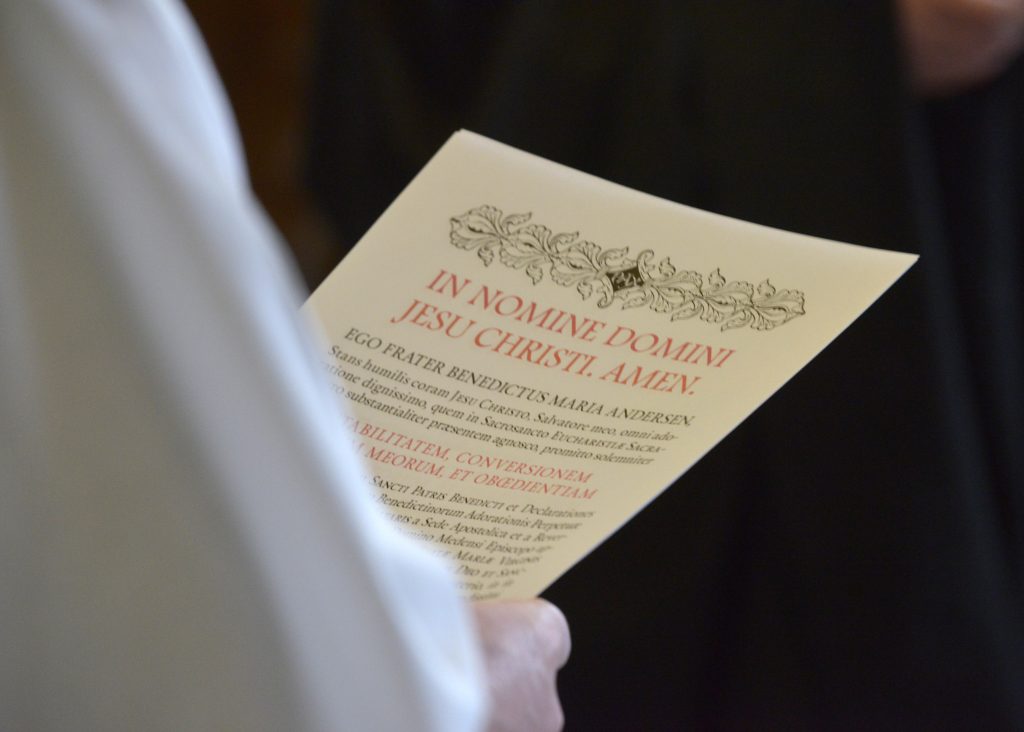Of the Observance of Lent (2)

CHAPTER XLIX. Of the Observance of Lent
31 Mar. 31 July. 30 Nov.Although the life of a monk ought at all times to have about it a Lenten character, yet since few have strength enough for this, we exhort all, at least during the days of Lent, to keep themselves in all purity of life, and to wash away, during that holy season, the negligences of other times. This we shall worthily do, if we refrain from all sin, and give ourselves to prayer with tears, to holy reading, compunction of heart and abstinence.
1 Licet omni tempore vita monachi quadragesimae debet observationem habere, 2 tamen, quia paucorum est ista virtus, ideo suademus istis diebus quadragesimae omni puritate vitam suam custodire omnes pariter, 3 et neglegentias aliorum temporum his diebus sanctis diluere.
Saint Benedict says that during the days of Lent, the monk is to keep himself in all purity of life, omni puritate vitam suam custodire.
Mercy and judgment I will sing to thee, O Lord: I will sing, and I will understand in the unspotted way, when thou shalt come to me. I walked in the innocence of my heart, in the midst of my house. (Psalm 100:1–2)
What does it mean to keep oneself in all purity of life. Purity of life is singleheartedness. It means to be the man of one thing only, for “where thy treasure is, there is thy heart also” (Matthew 6:21). This goes to the very meaning of the word monachos (μοναχός). Literally, the word refers to a man who is single or alone, but among Christians it came to refer also to the singlehearted man, to the man who, using Saint Benedict’s expression “prefers nothing to the love of Christ” (Chapter IV).
Purity of life is lost when a monk allows his heart to be divided among a multiplicity of interests and appetites. Purity of life begins to be restored when a monk forsakes all of those things that solicit him, and counters every temptation by saying with the Apostle, “For to me, to live is Christ: and to die is gain” (Philippians 1:21), and again, “I count all things to be but loss for the excellent knowledge of Jesus Christ my Lord; for whom I have suffered the loss of all things, and count them but as dung, that I may gain Christ” (Philippians 3:8).
If a man comes to the monastery saying (or even thinking), “I come to seek God, but I also want alongside of God this thing, this gratification, this possibility, this opportunity, etc.”, he is presenting God with a divided heart. Purity of life is wanting because such a man entertains the illusion that he can say “Yes” to God without saying “No” to everything else, or that he can live for God alone without forsaking all else. For Saint Benedict there are no hyphenated monks: not the monk–scientist, not the monk–artist, not the monk–professor, not the monk–farmer, not the monk–writer, not even the monk–priest. This is not to say that a monk cannot be a scientist, artist, professor, farmer, writer, or even priest. A monk can be any one of these things and more besides, but as soon as he begins to organise his life in function of anything other than seeking God alone in obedience and in ceaseless prayer, he loses that purity of life that Saint Benedict prizes so highly.
The Benedictine Lent is a season of pruning and of detachment, a time to let go of the preoccupations that make a man “troubled about many things” and forgetful of “the One Thing Necessary” (Luke 10:41–42).
